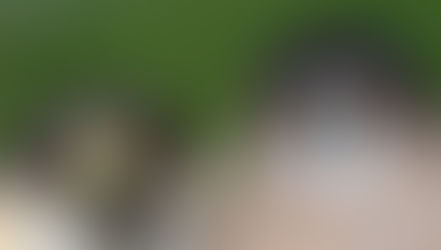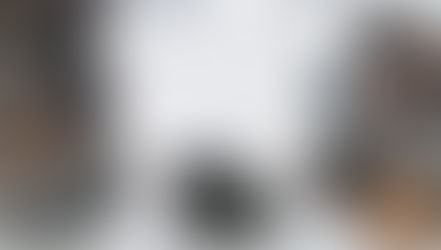Canada Goose vs Cackling Goose - White-Cheeked Goose Identification
- Zach (Head Flocker)

- Nov 22, 2024
- 5 min read
White-cheeked goose identification is a mess. Let's simplify the process together!

If these identification articles are helpful, please consider JOINING THE FLOCK!
Canada Goose, Meet Cackling Goose
In 2004, a complication was added to every birder's checklist. The Cackling Goose, Branta hutchinsii, was split from the Canada Goose, Branta canadensis. While listers were able to add a tick to their life-lists, many birders were faced with an identification conundrum.
The split was based on sound science, however, recent studies have shown there are several zones of hybridization between the two species. Additionally, research shows Canada Goose size can be a product of nutrition. Luckily for us, there is a species of bird called a "slash." What is the slash? Let me give you an example to explain:
You are performing a community science survey in your local community. You see a goose that does not fit perfectly as a Cackling Goose, but there is also something about it that does not fit a Canada Goose. You get out your handy pen, and you write Canada Goose/Cackling Goose. #slash
See how easy that fix is? If you struggle with the identification of these two species, I encourage you to record them as a slash. If you are birding just for fun or listing and not reporting your data, then the slash is not useful for you!
As an Amazon Affiliate, we earn from qualifying purchases.
Links may lead to affiliate sites.
Before we dive or dabble in, here are our top recommendations for waterfowl field guides:

Cackling Goose Identification Basics
One of the most commonly used keys for the identification of the Cackling Goose is its size. While this can be helpful, I would deter most from using it as the sole trait for ID. If the bird is sitting/standing/swimming, look to the face. The Cackling Goose has a distinctly cute face with a short, stubby bill and a steep forehead. Their white-cheek patch does not extend as high on their face, as the Canada Goose. Generally, they can have warmer tones overall to their bodies. Some might also point to their longer primary projection, but if you are not familiar with using this trait, skip it. Their necks, even when extended, are "stubbier" than even the smaller-sized Canada Goose individuals. This contributes to the "cute" look.

Canada Goose Identification Basics
You are probably quite familiar with the Canada Goose. Yes, the large, loud, and often aggressive goose, affectionately known as cobra-chickens. Their bill is longer, more slender appearing, and they have a sloping forehead (with exceptions - see the bottom photos). They are more "sleek" than cute, and even smaller individuals still have the more slender appearing bill. "Tweeners" can be tough, and are often great candidates for the "slash" pile (get it?).
What about the "Lesser" Canada Goose (Branta canadensis parvipes)? Who knows. Many have deemed it unworthy of subspecies status. The research showing the effects of juvenile nutrition on size, seem to support this idea. In fact, in eBird, B. c. parvipes has been lumped into the canadensis group. If you are struggling with an identification, slash it.

Cackling Goose vs Canada Goose
A direct comparison is needed for effective trait learning. Below are sections covering various traits that are useful for Cackling Goose identification when compared to most Canada Goose subspecies. No single trait should be trusted when identifying these white-cheeked geese.
Size difference of the Canada Goose and Cackling Goose

The size displayed above is not a guarantee. Many factors play into size in the white-cheeked goose populations. However, the Cackling Goose is closer to the size of a Mallard than a Moffit Canada Goose. Size can help pick the unusual birds out from the flock but do not depend solely upon it.
Bill Shape, Size, and Angle of the Cackling Goose & Canada Goose

The Cackling Goose bill is distinct. It is short and stubby, but more so, it has a steeper angle of inclination. If we were to create a triangle from these two bill types, the Cackling Goose would have a right or equilateral triangle, while the Canada Goose would have an isosceles triangle. The tweener pictured above comes from a Canada Goose that was hardly larger than the Cackling Geese it was flocked with. However, its bill still leans toward the isosceles triangle. Additionally, the nares of the Cackling Goose are more consistently elliptical, whereas the nares on the Canada Goose are more asymmetrical, often with a "kink" around the midpoint.
Our recommended mid-tier binoculars: Vortex Razor HD Prisms
Want more binocular recommendations? Check out our binny post, HERE!
Head comparison: Cackling Goose and Canada Goose
In the photo below, look at the GISS of these two faces. The heads are not to scale, but the Cackling Goose clearly still has the short, stubby bill and face. This gives the bird the previously mention "cuter" appearance. The head is also more "boxy," due to the steep forehead. The white check patch does not extend above the eye, the bill is right triangle-ish, and the nares are symmetrical. The cheek patch on the Cackling Goose shows an "indent" under the eye. While the Canada Goose can show this too, it is another tool in your toolbag for Cackling Goose Identification. Finally, look at the proximal bit of the exposed culmen (the part of the bill closest to the eye). In a limited test, this feature is more extensive in the Canada Goose, giving it a "peaked" appearance.

Cackling Goose Range

Photos of Cackling Geese and Canada Geese
Image 1: Note the cute profile, small bill, short necks, bill angle, and overall stubbiness of these Cackling Geese.
Image 2: This Canada/Cackling Goose is not much larger than the nearby Cackling Geese; however, its bill and head show more traditional Canada Goose traits.
Image 3: These two Cackling Geese give that stubby impression while swimming.
Image 4: This Canada Goose does not hate you. It is merely hungry.
Want to take better bird photos? Check out our favorite superzoom: Sony RX10 IV

Check out our other camera recommendations HERE!
Image 1: Note the white-collar. I do not use the collar in the identification of white-cheeked geese. See the next photo.
Image 2: The front individual has a noticeable white collar. The rear individual has a prominent "lump" on its forehead, giving the false sense of a steep forehead. Who could have sucker-punched this goose? Me. It was me. That cobra-chicken stole my sandwich.
This post was labor-intensive. I hope you found it helpful because these identification posts are brain-busters. I take and edit the majority of the photos. Additionally, I create many of the graphics you see here. Please, sign-up or you risk angering the cobra-chickens. You will be one of the first to receive an email when these posts come out. And please, share with your bird friends, family, and most importantly, your bird rivals.
Want more bird poop like this? Then, sign up for site notifications, like us on Facebook, follow us on Instagram and Twitter, and visit our Amazon Storefront.
Credits/References
Cackling Goose Range Map: Fink, D., T. Auer, A. Johnston, M. Strimas-Mackey, O. Robinson, S. Ligocki, B. Petersen, M. Iliff, and S. Kelling. eBird Status and Trends. Version: November 2019. https://ebird.org/science/status-and-trends. Cornell Lab of Ornithology, Ithaca, New York.































Love this, thanks for explaining! It was puzzling me on and off for a year. Love the "this Canada goose does not hate you, it is merely hungry". They're somewhat one and the same, but anyway...